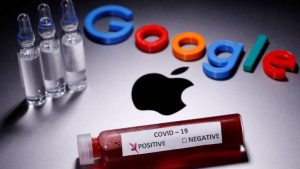Healthcare is a unique industry – one characterized by some of the most awe-inspiring scientific breakthroughs and yet mired in its own bureaucracy. Now, COVID-19 has torn through almost every country, and medicine is racing to respond to an unprecedented demand for services. These are new frontiers for the health industry, and tech companies are the pioneers.
Typically, it would take much for these two competitors to call a truce and join forces, but that's precisely what Google and Apple have done. In a bid to finally break into the $3 trillion healthcare market, the tech firms are collaborating on the way to track the spread of the coronavirus. It's an ambitious undertaking – one that involves incorporating disease-monitoring technology into almost every mobile phone manufactured anywhere. Millions of people may soon be engaging with their healthcare systems via their smartphones.
“All of us at Apple and Google believe there has never been a more important moment to work together to solve one of the world’s most pressing problems,” the companies said. “Through close cooperation and collaboration with developers, governments, and public health providers, we hope to harness the power of technology to help countries around the world slow the spread of COVID-19 and accelerate the return of everyday life."
While it's true there is potential for a high reward; it's possible the risk may not pay off. The joint venture isn't the first initiative that Silicon Valley has launched into the healthcare sphere. There have been genetic testing start-ups, AI-powered CT scanning software, and promising analytic platforms. In 2008, Google launched Google Health to store a customer’s medical data and share that information with companies like CVS, Quest Diagnostics, and Walgreen’s so they can better manage their health online.
Alphabet, Google’s parent company, also started Calico in 2013 with the noble mission of extending the human life span. Alphabet offshoot Verily also experimented with tracking heart disease through glucose-monitoring contact lenses and artificial intelligence-enhanced algorithms. The internet giant eventually scrapped both projects, but the "fail fast, fail often" philosophy keeps them focused on the future.
Many experts have identified that COVID-19 is transmitted through close proximity to those infected and believe that contact tracing is an essential tool for containment. There are several plans underway to develop technology for individual opt-in "exposure notification." To advance that cause, Google and Apple will be offering a comprehensive solution that will encompass APIs and software that will be incorporated into the smartphone operating systems. More specifically, the software will enable health organizations and agencies to track contact with the virus through blue tooth technology when two or more devices belonging to affected individuals come into contact. Both companies have assured they would safeguard the privacy of their users every step of the way.
Despite the project's potential, many governments are trying to put the brakes on the technology for several reasons. France, for example, is requesting that Apple and Google change specific settings to allow a state-designed contact tracing application to run unhindered on users' phones. As it stands, the phone manufacturer does not allow information gathered from blue tooth data running in the background to be moved off a user's phone for privacy reasons. So far, neither company has relented.
Britain and Australia have also balked at allowing Google and Apple to roll out these offerings in their countries due to similar concerns about privacy. One concern involves how the Australian app asks users to provide names, phone numbers, postal codes, and approximate ages. Meanwhile, the trend closer to home is a more welcoming one. The states of Utah, North and South Dakota have all launched their apps for contact tracing, and other projects are underway.























